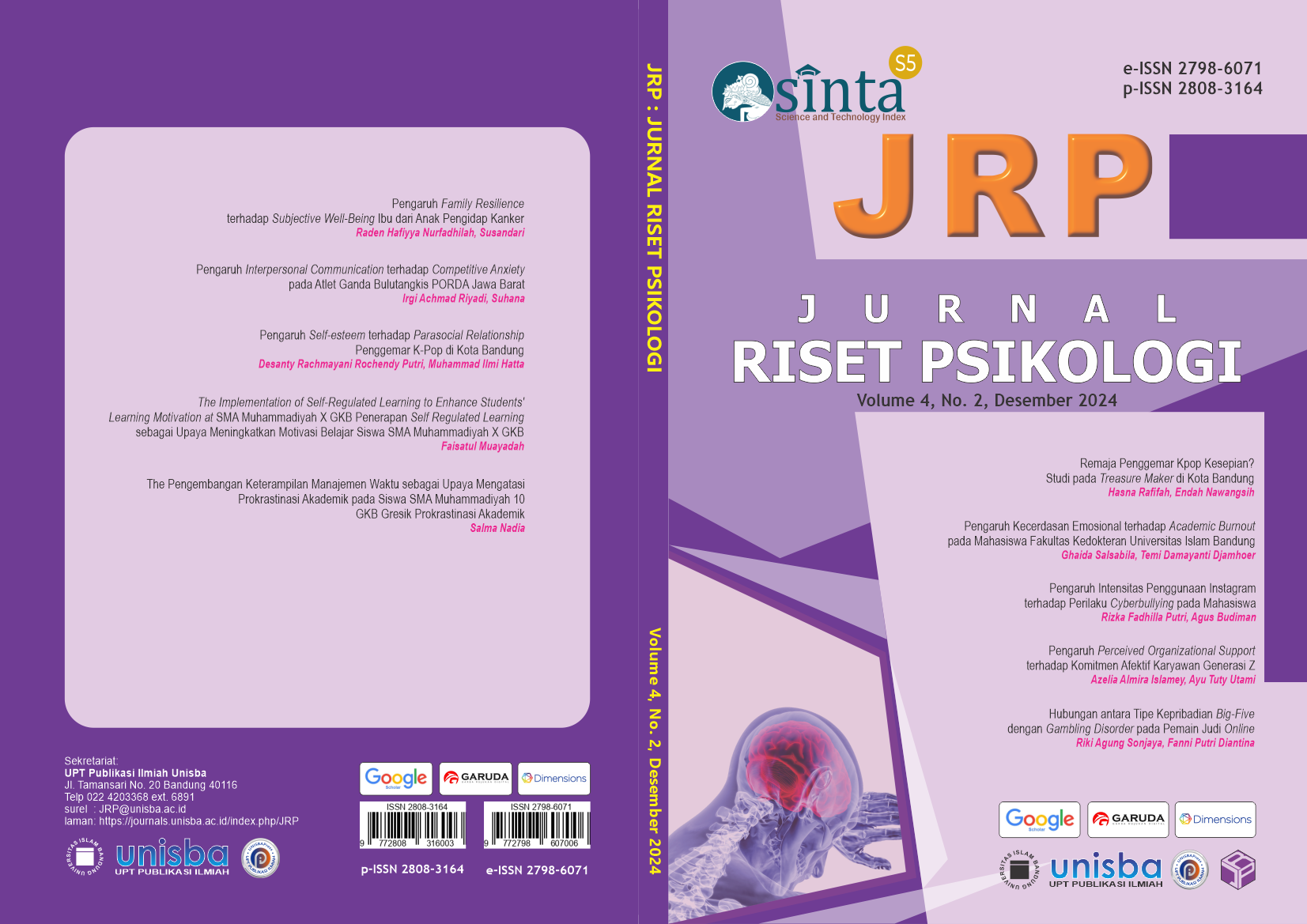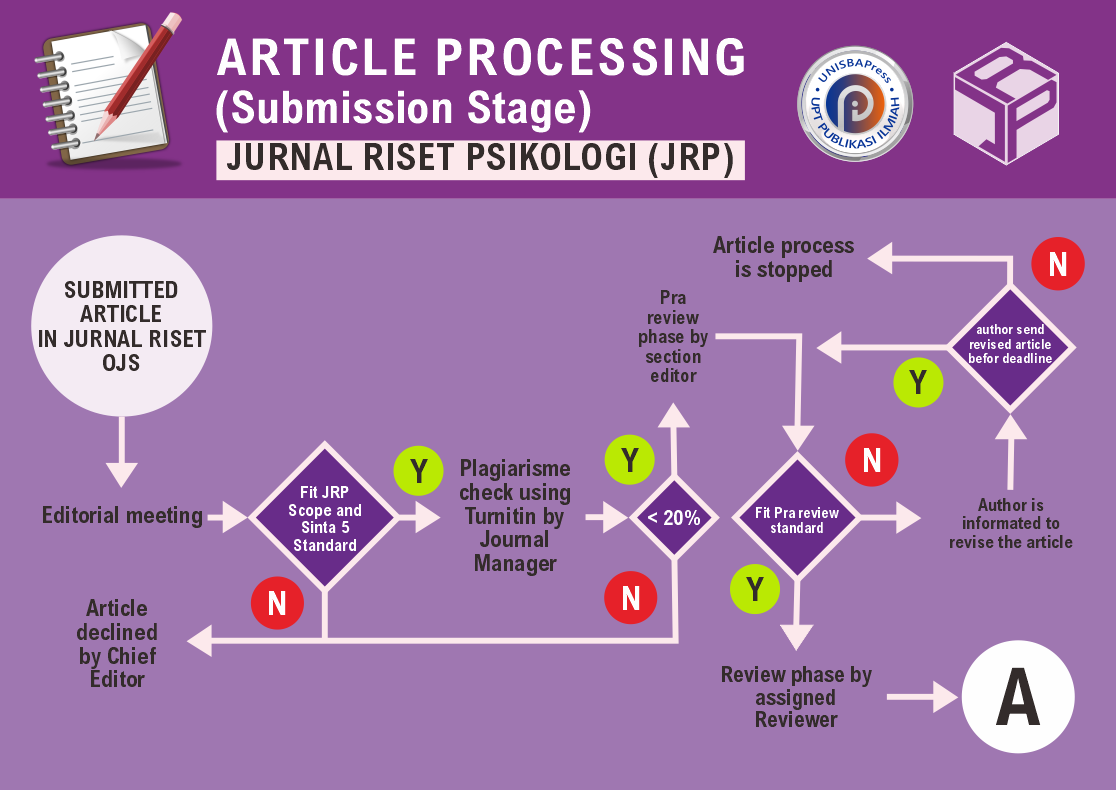Hubungan antara Tipe Kepribadian Big-Five dengan Gambling Disorder pada Pemain Judi Online
DOI:
https://doi.org/10.29313/jrp.v4i2.5130Keywords:
big five personality, gambling disorder, online slot gamblingAbstract
Abstract. Gambling is a form of gaming that involves a certain amount of money. Gambling in the current era is growing rapidly where there are lots of sites that provide various types. Gambling that is currently popular is online slot gambling. This gambling causes addictive behavior, uncontrolled gambling behavior can become a problem. This personality greatly influences a person's addiction, nature and personality are one of the factors that can influence a person's addiction. Therefore, this research aims to see the relationship between the Big Five personality theory and Gambling Disorder in online slot gambling players. The instruments used in this research were the Big Five Inventory-2 (BFI-2) developed by Soto & John (2017) and adapted to the Indonesian version by Ahya & Siaputra (2021) and the Problem Gambling Severity Index (PGSI) developed by Ferris & Wynne (2001). This research data was obtained from 280 respondents selected using purposive sampling techniques. This research method uses a correlational method with Spearman rank test analysis. The research results show that the Openness aspect has a significant positive correlation with gambling disorders of (0.495), the Conscientiousness aspect has a significant positive correlation of (0.522), the Extraversion aspect has a significant positive correlation of (0.148), the Agreeableness aspect has a significant positive correlation of (0.148) a significant positive correlation of (0.227), and the Neuroticism aspect has a significant positive correlation. positive (0.596).
Abstrak. Gambling merupakan sebuah bentuk permainan yang melibatkan sejumlah uang, perjudian di era sekarang berkembang pesat dimana banyak situs-situs yang menyediakan beragam jenisnya, perjudian yang sedang marak saat ini yaitu judi slot online. Perjudian ini menimbulkan perilaku kecanduan, perilaku berjudi yang tidak terkendali dapat menjadi masalah (problematic). Kepribadian ini sangat mempengaruhi dari kecanduan seseorang, sifat dan kepribadian adalah salah satu faktor yang dapat berpengaruh terhadap kecanduan dari individu. Karena itu, penelitian ini bertujuan untuk melihat hubungan antara Teori kepribadian Big Five dan Gambling Disorder pada pemain judi slot online. Instrumen yang digunakan dalam penelitian ini adalah Big Five Inventory-2 (BFI-2) yang dikembangkan oleh Soto & John (2017) dan diadaptasi ke versi bahasa Indonesia oleh Ahya & Siaputra (2021) dan Problem Gambling Severity Index (PGSI) yang dikembangkan oleh Ferris & Wynne (2001). Data penelitian ini diperoleh dari 280 responden yang dipilih menggunakan teknik purposive sampling. Metode penelitian ini menggunakan metode korelasional dengan analisis uji rank spearman. Hasil menunjukan aspek Openness signifikan berkorelasi positif terhadap gambling disorder sebesar (0,495), aspek Conscientiousness signifikan berkorelasi positif sebesar (0,522), aspek Extraversion signifikan berkorelasi positif sebesar (0,148), aspek Agreeableness signifikan berkorelasi positif sebesar (0,227), dan aspek Neuroticism signifikan berkorelasi positif sebesar (0,596).
References
M. Griffiths, “Addiction trends: internet v casino gambling.,” Casino and Gaming International, vol. 2, no. 1, pp. 85–91, 2006.
M. Griffiths, J. Parke, R. Wood, and J. Rigbye, “Online Poker Gambling in University Students: Further Findings from an Online Survey,” Int J Ment Health Addict, vol. 8, no. 1, pp. 82–89, Jan. 2010, doi: 10.1007/s11469-009-9203-7.
R. Kent-Lemon, “From Liberty Bell to Online Slots: The Evolution of Gambling Machines,” Casino Journal Press, 2023.
American Psychiatric Association, Diagnostic and statistical manual of mental disorders (DSM-5), 5th ed. American Psychiatric Association, 2013.
A. Rozana and H. Purnama, “Work-Family Conflict Pada Pekerja Wanita Era Moder,” Psikoborneo Jurnal Imiah Psikologi, 2022.
M. Griffiths, “Internet gambling: issues, concerns and recommendations,” CyberPsychology and Behavior, vol. 6, pp. 557–568, 2003.
Pusat Pelaporan dan Analisis Transaksi Keuangan (PPATK), “Perputaran Uang dalam Perjudian di Indonesia 2017-2022.",” PPATK. [Online]. Available: https://www.ppatk.go.id
J. D. Miller, “Personality Disorders and Problem Gambling Severity in a Sample of Help-seeking Gamblers,” J Pers Disord, vol. 25, no. 1, pp. 49–55, 2011.
D. L. King and P. H. Delfabbro, “The Epidemiology of Adolescent Gambling: Prevalence, Risk Factors, and Harm.,” J Gambl Stud, vol. 35, no. 1, pp. 1–15, 2019.
L. R. Goldberg, “An alternative ‘description of personality’: the Big-Five factor structure,” J Pers Soc Psychol, vol. 59, no. 6, pp. 1216–1229, 1990.
C. J. Soto and O. P. John, “The next Big Five Inventory (BFI-2): Developing and assessing a hierarchical model with 15 facets to enhance bandwidth, fidelity, and predictive power.,” J Pers Soc Psychol, vol. 113, no. 1, pp. 117–143, Jul. 2017, doi: 10.1037/pspp0000096.
A. Ahya and I. B. Siaputra, “Validasi Big Five Inventory-2 (BFI-2) untuk Indonesia: Belum sempurna tetapi valid dan reliabel mengukur kepribadian,” Jurnal Psikologi Ulayat, Nov. 2021, doi: 10.24854/jpu458.
J. A. Ferris, The Canadian problem gambling index. Canadian Centre on Substance Abuse, 2001.
F. W. H. Dudfield, J. M. Malouff, and J. Meynadier, “The Psychological and Behavioral Factors Associated with Gambling: A Comprehensive Study,” J Gambl Stud, vol. 38, no. 1, pp. 123–145, 2022.
N. Zamila and E. N. Nugrahawati, “Pengaruh Kepribadian (Five Factor Personality) terhadap Perilaku Cyberbullying pada Pengguna Media Sosial,” Jurnal Riset Psikologi, vol. 3, no. 1, pp. 61–68, Jul. 2023, doi: 10.29313/jrp.v3i1.2060.
Global Betting and Gaming Consultants (GBGC), “Global Gambling Report,” 2022.
R. R. McCrae et al., “Consensual validation of personality traits across cultures,” J Res Pers, vol. 38, no. 2, pp. 179–201, Apr. 2004, doi: 10.1016/S0092-6566(03)00056-4.
A. L. Ariadne and E. N. Nugrahawati, “Pengaruh Kecerdasan Emosi terhadap Kekerasan dalam Pacaran Pada Mahasiswa di Kota Bandung,” Jurnal Riset Psikologi, vol. 3, no. 2, pp. 139–146, Dec. 2023, doi: 10.29313/jrp.v3i2.2954.













